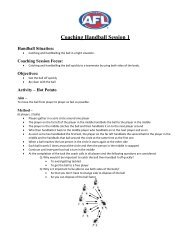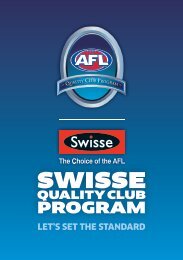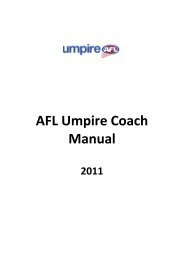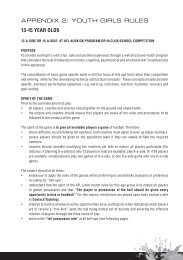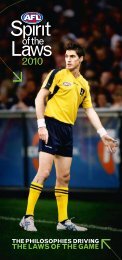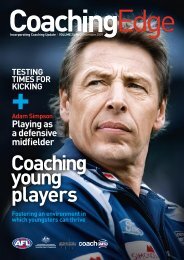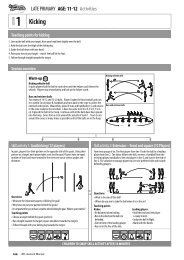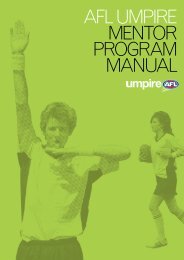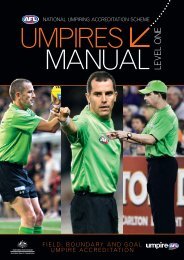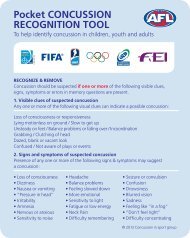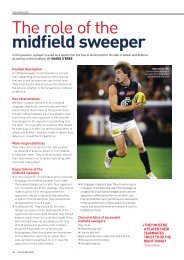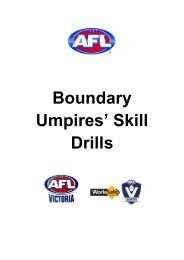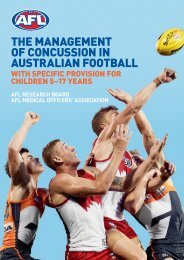2012 Youth Coaching Manual - AFL Community
2012 Youth Coaching Manual - AFL Community
2012 Youth Coaching Manual - AFL Community
You also want an ePaper? Increase the reach of your titles
YUMPU automatically turns print PDFs into web optimized ePapers that Google loves.
Specific Safety Considerations<br />
Dealing with emergencies<br />
Planning what to do when an emergency occurs is an essential part of risk management. <strong>Youth</strong> leagues must be conversant<br />
with procedures and able to deal with emergencies so young players are well cared for.<br />
Leagues should ensure a person with current first-aid qualifications is available at all games and seek medical opinion when:<br />
• the health of a participant is questionable;<br />
• recovery from illness/injury is uncertain; and<br />
• a participant is injured during training/competition.<br />
When medical advice cannot be obtained, the league and/or club should not allow the player to participate.<br />
A first-aid kit must be available at training and competition venues. Sport-specific rescue equipment should also be accessible.<br />
Emergencies should be formally reported, discussed, and changes made to procedures if needed.<br />
First-aid Officer/Trainer<br />
For the safety of all players the following minimum levels of accreditation for providing first-aid and trainer<br />
services will apply:<br />
• <strong>Community</strong> <strong>Youth</strong> (13-14 years) – sports first-aid course/basic first-aid course; and<br />
• <strong>Community</strong> <strong>Youth</strong> (15-18 years) – Level 1 trainer/basic trainers course (must include current emergency first-aid qualification).<br />
Medical conditions<br />
Special medical conditions<br />
Some medical conditions may create concern for coaches and parents. Generally, active sports are beneficial to most people<br />
with medical conditions. However, a medical certificate should be provided if there is potential for the condition interfering<br />
with participation, or playing football could adversely influence the condition.<br />
Some conditions may require coaches to be informed if specific medical assistance could be necessary.<br />
Common conditions such as asthma, epilepsy and diabetes require an emergency management plan to be provided. Players<br />
with heart problems or who have lost one of a paired organ system (e.g. eye, kidney, testicle) need a specific medical<br />
clearance to play.<br />
Infectious diseases<br />
Playing football, as with all team sports, involves players living and training in close contact with others. While this increases<br />
the risk of contracting common illnesses such as respiratory infections, skin infections or gastroenteritis. The following<br />
simple measures can reduce the chances of transmission of these infections:<br />
• avoiding sharing drink bottles;<br />
• washing hands regularly;<br />
• avoiding spitting;<br />
• a generally clean environment in change rooms.<br />
These specific rules apply to players with acute bleeding during a game:<br />
• they should be removed from the ground immediately and the bleeding controlled;<br />
• they may require medical attention;<br />
• all open wounds should be covered before returning to play;<br />
• all clothing contaminated with blood should be removed and washed.<br />
These measures reduce the risk of transmission of blood-borne viruses.<br />
Illness and participation<br />
During times of illness, the player’s body is particularly vulnerable, with an increased risk of damage to tissues or organs.<br />
When ill or feverish, players should not participate.<br />
<strong>AFL</strong> <strong>Youth</strong> <strong>Coaching</strong> <strong>Manual</strong><br />
107



